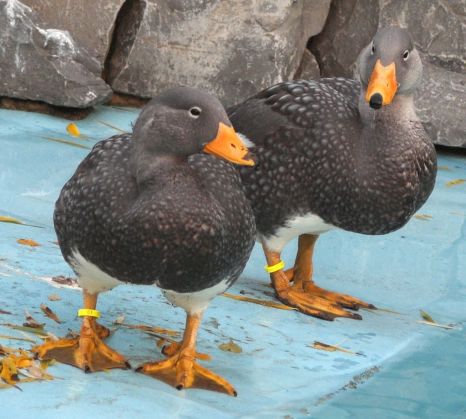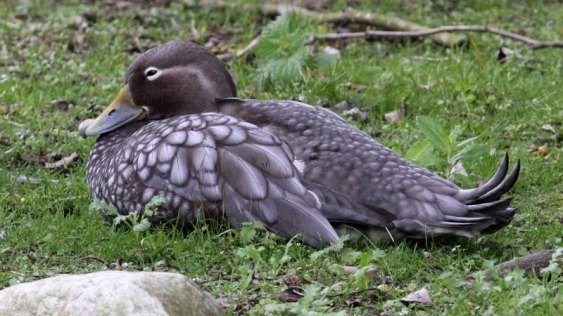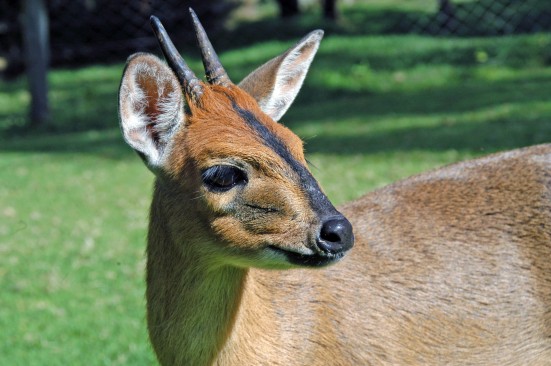I’m still collecting bird foraging and dietary data, a task which can get a little monotonous. There are plenty of avian facts that make me laugh, though, including the fact that there’s a bird called the “Flightless Steamerduck” as well as a “Flying Steamerduck,” both native to the Straits of Magellan (southern Chile and Argentina). They sound more like an invention of some mad scientist in a YA steampunk novel than a bird, but so it goes.
As you might guess, the Flightless Steamerduck does not fly, but the Flying Steamerduck does.

Flightless Steamerduck, Tachyeres pteneres (Anseriformes: Anatidae). Source: Wikipedia.
 Flying Steamerduck, Tachyeres patachonicus. Source: Wikipedia.
Flying Steamerduck, Tachyeres patachonicus. Source: Wikipedia.
The word “duck” can be traced to the Old English duce (“duck”), which likely came from ducan (“to dive” or even “to duck”). Yes, the informal verb “to duck” meaning “to make a sudden descent” has been in English for over a thousand years. This is also probably the source of the word “dove,” as in a type of pigeon: the Latin word for “dove,” columba, comes from the Greek κολυμβίς (columbis), meaning “diver.” Because I guess doves dive? It’s also the source of the word “duiker” (a type of antelope), from the Dutch duiker (“diver”), named for their habit of plunging into bushes when threatened.

A Common Duiker (Sylvicapra grimmia) — so cute! Source: Wikipedia.
The word “steam” also has its roots in Old English: stéam (cf Dutch stoom, Frisian steam). “Steamerducks” are thus called because to move in the water they flap their wings in the water as well as paddling their feet, making them look like paddle steamers. Finally, the suffix “-er” meaning “thing that does X” or “thing from X” is also Germanic, with Old English –ere, Old Norse -ar (which can be related to the various Scandinavian ari, are, ere through various declensions), German -er (Ich bin Berliner = I am a person from Berlin, Ich bin ein Berliner = I am a pastry from Berlin, otherwise known as a jelly doughnut, thanks JFK).
 Om nom Berliner nom
Om nom Berliner nom
This bird name is on a roll with the Old English names: “flight” comes directly from the OE flyht (cf German fliegen, Old Norse fljúga , etc, which are not cognate with either “to flee” or “to flow”). The Old English léas meant “free from” (whence “loose” meaning “unattached” or the Middle English les/lease meaning “lying” or “free from truth”), but only survived into Middle English, and thus Modern English, as a suffix.
The genus name Tachyeres comes from the Greek ταχυηρης (tachyeres) meaning “fast rowing,” again referring to the ducks’ wing-paddling behavior.
The species name for the flightless duck, pteneres, comes from the Greek πτηνος (ptenos), meaning “feathered” or “winged,” which shares the same root as “pterodactyl” (“winged fingers”) or “helicopter” (“spiraled wing”, as in “helix”). The species name patachonicus is just a Latinized version of “Patagonia,” the region where the birds are form. The precise origin of the word “Patagonia” is a bit obscure, though after Patagonia was discovered, a version of the word entered Spanish and Portuguese to mean “giant” (as the people of Patagonia were said to be very tall).
Pingback: White-winged Diuca-finch: Diuca speculifera | Name This Bird